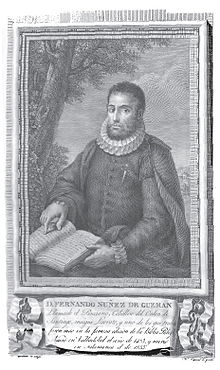Refranes o proverbios en romance
The Refranes o proverbios en romance (German for example: Proverbs or proverbs in Romansh ) are a Spanish collection of proverbs - especially Castilian proverbs - by Hernán Núñez el Pinciano . "They form the core of all later collections of proverbs". It is an example of the taste for wisdom literature in the Romance languages that prevailed during the Renaissance .

Hernán Núñez, el Pinciano (1475–1553) was a Spanish humanist , classical philologist and polyglot . He studied Hebrew and Arabic as well as classical languages. Cardinal Gonzalo Ximénez de Cisneros (1436-1517) hired him as a censor of the cardinal press in Alcalá de Henares (which was called Complutum in Roman times ), and there Nuñez worked on the Complutensische Polyglotte ( Biblia políglota complutense ), the first printed polyglot of the complete Bible . Nuñez then ended his career in Salamanca as a professor of rhetoric and Greek at the university .
This text, published only after his death (Salamanca: Juan de Canova, 1555) is considered to be one of the most comprehensive and monumental proverbs, as it contains almost 2000 proverbs in numerous languages, in addition to the proverbs in the Castilian language, also those from the languages Catalan and Galician , Portuguese , French , Italian , Asturian , Aragonese , Latin and Greek . The work was very popular and was reprinted several times. It was controversial because of the anti-clerical nature of some of the proverbs and ended up being censored. In some later editions the more obscene proverbs are missing.
The great English Spain expert Richard Ford (1796-1858) mentioned the collection in his handbook for Spain travelers ( A hand-book for travelers in Spain ) as a great literary achievement.
Examples
Text examples in the writing of the first edition (1555).
|
Quien con tosco ha de entẽder, mucho seso ha de tener. |
Anyone who has to deal with chunky things needs a lot of understanding. |
|
Cantar en la yglesia, llorar en casa. |
Sing in church, cry at home. |
|
Cacarear, y no poner hueuo. |
Cackle but don't lay eggs. |
|
Lo que la loba hace, al lobo aplaze. |
What the wolf does, pleases the wolf. |
|
Mas tiran tetas, que exes, ni carretas. |
Two tits pull harder than an axle and a cart. |
See also
literature
expenditure
- Hernán Núñez: Refranes, o Proverbios en romance. Salamanca, Juan de Canova 1555 digitized . (New editions 1578 , 1602, 1611, 1618, 1621 etc.)
Secondary literature
- Arturo del Hoyo : "The tradition of Spanish proverbs", see under Brandenberger, Erna
- Erna Brandenberger : Refranero español: [Spanish-German] = Spanish proverbs / ed. by Erna Brandenberger. With an afterward from Arturo del Hoyo. Ill. By Frieda Wiegand / dtv; 9106: dtv bilingual Edition Langewiesche-Brandt. Munich: Dt. Taschenbuch-Verl., 1991, ISBN 978-3-423-09106-0 (therein: Arturo del Hoyo: The Tradition of Spanish Proverbs)
- Abraham Madroñal: Los Refranes o Proverbios en Romance (1555), de Hernán Núñez Pinciano. RLit, LXIV, 127, 2002; Consejo Superior de Investigaciones Científicas Licencia Creative Commons 3.0 España (by-nc) online
Web links
- Digitized version of the first edition from 1555
- Antiquarian bookshop catalog Shapero Rare Books
- Biblioteca de Hernán Núñez, el Pinciano
- Refranes o proverbios en romance / que coligio y glosso ... Hernan Nuñez ... Y la Filosofia Vulgar ...
References and footnotes
- ↑ With a more complete title: Refranes, O Proverbios En Romance, Qve Nvevamente colligiò y glossò el Comendador Hernan Nuñez, Professor eminẽtissimo de Rhetorica, y Griego, en Salamanca. Van Pvestos Por la orden del Abc [etc.] .
- ↑ Arturo del Hoyo: "The tradition of Spanish proverbs", in: Erna Brandenberger, p. 89.
- ↑ Shapero Rare Books second-hand bookshop catalog - accessed on August 7, 2019
- ^ Ford, Richard: A hand-book for travelers in Spain. John Murray , London 1845 ( Murray's Handbooks for Travelers ), p. 84
- ^ Edition 1555, p. 111
- ↑ cf. the translation at Proverbios y refranes español-alemán Q
- ^ Edition 1555, p. 21
- ^ Edition 1555, p. 21
- ↑ Edition 1555, p. 70
- ↑ Edition 1555, p. 75
- ↑ That is, because of a (beautiful) woman, everything is left standing.
- ↑ Arturo del Hoyo: The tradition of Spanish proverbs, in: Refranero español: [Spanish-German] = Spanish proverbs. Edited by Erna Brandenberger, p. 89
